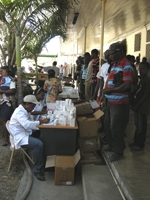"Paradigm-shifting" is how Dr. Andrew Schafer, chairman of the Department of Medicine, described Dr. Daniel W. Fitzgerald's recently published paper in the New England Journal of Medicine on the early initiation of antiretroviral therapies for HIV patients. That accolade made Dr. Fitzgerald the clear choice for presenting the Department of Medicine's first Grand Rounds for the new academic year.

Patients receive medication at GHESKIO.
The paper, authored by Dr. Fitzgerald and several other doctors and researchers from Weill Cornell and the GHESKIO clinic in Port-au-Prince, Haiti, has made such a dramatic impact that the World Health Organization recently revised its treatment protocols for HIV patients based on the researchers' findings.
The research, which was published in the July 15 issue of NEJM, indicates that rather than waiting until an HIV patient's CD4+ T cells fall below the threshold of 200 cells per cubic millimeter — as the previous WHO guidelines suggested — immediately initiating antiretroviral therapy (ART) greatly improved the efficacy of those medications. The study also linked early intervention with a decreased rate of incidence of tuberculosis, a leading cause of death among HIV patients in resource-poor countries.
Between 2005 and 2008, the investigators recruited 816 HIV-1-infected patients at the GHESKIO clinic in Port-au-Prince. All had CD4 counts between 200 and 350, with no history of AIDS illness, and had never received ART, a drug cocktail that works by inhibiting the enzyme that enables HIV to hijack healthy cells and replicate. The cocktail in this case contained zidovudine, lamivudine and efavirenz. Study participants were randomly divided into two groups; those in the first group began ART immediately, and those in the second (control) group received ART only when their CD4 counts measured 200 or lower — standard treatment protocol. Of the 408 subjects in the control group, 160 reached the 200-count threshold and received ART during the study.
After three years, only six patients in the early initiation group had died, versus 23 in the control group. And of those six deaths, only one was caused by an infectious disease.
"There are more than 5 million HIV patients in developing countries who will be able to take advantage of this research," Dr. Fitzgerald said.
Dr. Fitzgerald also addressed the cost effectiveness of beginning ART before CD4+ T-cell levels hit 200 — an issue that has already been raised in the wake of the findings.
On average, it was 24 months before the patients in the group that followed the standard protocol fell to the appropriate T-cell threshold or developed an AIDS-related illness, thus triggering the beginning of treatment, Dr. Fitzergald explained. Those two years saved about $400 per patient in drug costs.
"It would cost $200 a year to put someone on ART early instead of just sitting there and watching them get sick," he said. "When patients have a CD4 count below 350, they can get sick at any minute and they can die at any minute. Start therapy."
This kind of groundbreaking research, Dr. Fitzgerald said, is only possible because of the long-term, mutually beneficial partnerships Weill Cornell has fostered with clinical centers across the globe in the past 30 years.
Dr. Fitzgerald is part of a global health network of physicians and scientists who are working to not only treat underserved populations, but also train new physicians and conduct research that directly addresses the most pressing health concerns of developing nations. Dr. Fitzgerald serves as co-director of Weill Cornell's Center for Global Health with Dr. Warren Johnson, study co-author and the Center's director and the B.H. Kean Professor of Tropical Medicine at Weill Cornell Medical College; Dr. Jean Pape, founder and director of the GHESKIO clinic where the ART study was conducted, is also an important member of the global health network.
"The bottom line for us is the same as it is for everyone in this room: We want to save lives and improve health," Dr. Fitzgerald said. "The only difference is we are doing it in very poor settings. We are moving from bench top to bedside and from bedside to village."

